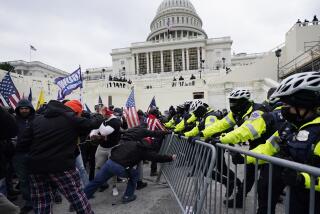Itâs not black and white
In ruling that New Haven, Conn., improperly abandoned a test for firefighters that resulted in no promotions for African Americans, five conservatives on the U.S. Supreme Court have disappointed civil rights groups and provoked an animated dissent from their liberal colleagues. This page is closer to the dissenters in principle, but Mondayâs decision isnât the disaster for diversity in the workplace that many feared.
Although the court split on familiar ideological lines, Justice Anthony M. Kennedyâs majority opinion is a measured response to a difficult case. The opinion reaffirmed that the Civil Rights Act protects employees of every race against discrimination, while preserving the obligation of employers, public and private, to ensure that seemingly neutral job qualifications donât unfairly disadvantage minorities.
The decision, which overturned a ruling by Supreme Court nominee Sonia Sotomayor and two other judges on the U.S. 2nd Circuit Court of Appeals, is a victory for 18 firefighters -- 17 whites and one Latino -- who sued the city after it scrapped the exam, ostensibly to avoid a lawsuit by black firefighters but also in response to protests. The lead plaintiff seeking reinstatement of the results was Frank Ricci, a dyslexic who studied eight to 13 hours a day, listening to audiotapes of test-preparation material.
In her dissent from Mondayâs ruling, Justice Ruth Bader Ginsburg suggested that the majority was unduly influenced by sympathy for Ricci and the other white firefighters. (In reading her opinion, Ginsburg changed âsympathyâ to âempathy,â possibly a riposte to conservatives who complain that Sotomayor would let empathy influence her decisions). That memorable judicial comeback highlighted a genuinely complex dispute, one sufficiently nuanced that even those who side with Kennedy should not fault Sotomayor for arriving at a different conclusion.
Title VII of the Civil Rights Act prohibits employers from discriminating on the basis of race -- language that protects whites as well as minorities. But a 1971 Supreme Court decision, later codified by Congress, extended the law to situations in which a job qualification, while neutral on its face, was discriminatory in operation. In such âdisparate impactâ cases, an employer must show that a test score or other requirement that disproportionately disadvantages minorities is job-related. At the same time, not every test on which minorities do poorly is automatically illegal, and, the majority ruled Monday, employers cannot simply discard a test after itâs given because someone might sue over the result.
Kennedyâs opinion doesnât prevent employers, including cities and states, from adopting tests that have proved to be both job-related and likelier than others to result in a diverse workplace. And because this decision is based on the Civil Rights Act, not the Constitution, it allows Congress to revisit the disparate-impact principle -- perhaps by requiring employers to take additional steps to ensure that tests are job-related. Congress should take advantage of that opening to protect governments that seek to diversify their workforces. There again, the decision strikes a useful balance: Efforts to achieve workplace diversity are desirable and permissible, but no one benefits when the Civil Rights Actâs ban on discrimination becomes the preserve of a single race.
More to Read
Inside the business of entertainment
The Wide Shot brings you news, analysis and insights on everything from streaming wars to production â and what it all means for the future.
You may occasionally receive promotional content from the Los Angeles Times.










